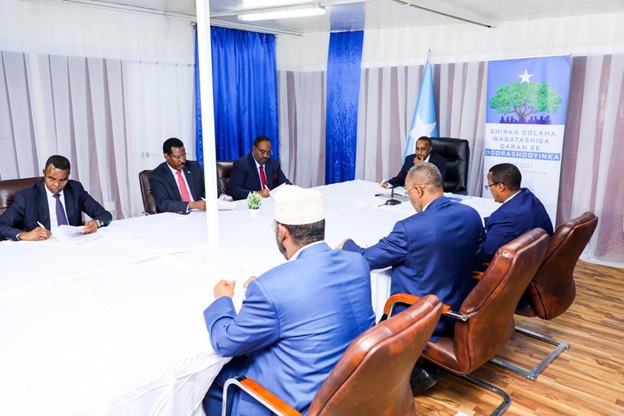Faisal A. Roble
The complicated journey for Somalia’s recovery started in earnest at the Arta convention, a Somali-owned gathering under a tent in Djibouti in 2000. About twenty one years later, hope could be found once again in a similarly Somali-owned gathering that took place in another tent, this time at Afisyoni, Mogadishu to end the stagnated governance crisis. Somalis are better off in settling their own problems, provided international community only provides logistical help.

Recovering Somali’s failed state has become more challenging than the effort that led to the founding of the modern Somali state. For example, from inception of the Somali Youth League (SYL in 1943) to independence in 1960, it only took 17 year to give Somalis the now-failed post-colonial state. Leaders then were mission focused and kept in their hearts the “greater good.”
However, to the chagrin of Somalia’s contemporary young generation – about 75 percent of the population is under thirty-five – reconstructing the 2nd republic, alias Somali Federal Republic, still needs a herculean work to right wrongs that took place pre- and post-civil war.
Civil war induced social pathologies in the form of displacement, terrorism, declined or near-absent social services, and corruption are all legacies of failed state. Much has not been done in these areas. To lead and manage fragile post-failed states conditions requires the art of prioritizing the “greater good.”
With politics being dominated by diaspora-based political carpetbaggers in the case of Somalia, however, some of whom only appear in Mogadishu during elections seasons, the pace of recovery has been sluggish, if not retarded.
In the last four years under the former President Mohamed Abdullahi Farmajo, events took a negative turn. Autocracy seemed in the offing. Mr. Farmajo controlled the majority of the two houses by paying them monies from Qatar; he befriended the two autocrats in the Horn (Prime Minister Abiy and his mentor and president of life, Isaias of Eritrea). And also flirted with Russia.

Farmajo (center)
Many today argue that had it not been a controversial intervention by regiments of the Somali National Army, the journey from a failed to an open federal government system would have been thwarted.
On April 25, 2021, hundreds of armed troops came and took positions in Mogadishu to challenge Mr. Farmajo’s declared statement of illegal term extension. Without this move by certain regiments that come to Mogadishu, national conversation would have been different.
Out of the confusion and near-open conflict, over 100,000 people deserted their neighborhoods out of fear of an open conflict. Business took a hit. National confidence dived.
However, there came a shining star and a glimmer of hope at the end of the confusion and crisis; the sweeping rejection of Mr. Farmajo’s term extension by FMS, particularly by Mr. Said Deni and Ahmed Islam, the international community’s unanimity to oppose term extension, and pressures from a contingent of presidential hopefuls squashed Farmajo’s design to possibly establish an autocratic rule.
Following a successful negotiation to return SNA regiments back to their barracks, Prime Minister Mohamed Hussein Rooble received nation-wide support and took full charge of both the security and the administration of the dragged election.
A quiet diplomacy towards the leaders of Puntland and Jubbaland ensued after Rooble took charge and continued for weeks; in the end, both Presidents Deni and Madobe extended their support to the new Prime Minister. PM Rooble also used community pressure and succeeded to end Qorqor’s and Guudlawe’s blind loyalty to President Farmajo. Thus, on April 27, 2021, they both announced their opposition to any term extension. And that was the dagger that hit at the heart of Mr. Farmajo’s devious intentions.
By May 27, 2021, a far-reaching communiqué on the election of 2021 and a vision to fix the long-neglected governance issues was signed by both the FSG and FMS leaders. The prospective presidential candidates and the speaker of the upper house, Abdi Hashi, blessed the communiqué.
Barring unforeseen challenges, Prime Minister Rooble appears to have delivered where Farmajo’s dragged. Still, he must watch out for two hotspots: one is Gedo and the other one is the prospect of his boss meddling in the selection process of Somaliland’s share of the seats.
At the cusp of history making, Rooble can either secure his place in Somali history or become another statistical blip in the long list of inconsequential Prime Ministers that litters Somalia’s troubled political landscape.
Knowing the unpredictable nature of Somali politics, Rooble would need many of the stakeholders to get and stay behind him. Above all, he must keep the spirit of serving the “greater good” in difference to politicians whose values are guided by the principle of the “tragedy of the commons” in search for their unbridled selfish interest.
One last advise: his timeline to hold election in 60 days may be a set up to fail. If possible, he needs to revise that timeline and have to change his timeline to deliver to a MINIMUM of 60 days and a MAXIMUM of 180 days. That will help him gain a room to breath.
Faisal A. Roble
Email: [email protected]
———–
Faisal Roble, a writer, political analyst and a former Editor-in-Chief of WardheerNews, is mainly interested in the Horn of Africa region. He is currently the Principal Planner for the City of Los Angeles in charge of Master Planning, Economic Development and Project Implementation Division
We welcome the submission of all articles for possible publication on WardheerNews.com. WardheerNews will only consider articles sent exclusively. Please email your article today . Opinions expressed in this article are those of the author and do not necessarily reflect the views of WardheerNews.
WardheerNew’s tolerance platform is engaging with diversity of opinion, political ideology and self-expression. Tolerance is a necessary ingredient for creativity and civility.Tolerance fuels tenacity and audacity.
WardheerNews waxay tixgelin gaara siinaysaa maqaaladaha sida gaarka ah loogu soo diro ee aan lagu daabicin goobo kale. Maqaalkani wuxuu ka turjumayaa aragtida Qoraaga loomana fasiran karo tan WardheerNews.
Copyright © 2024 WardheerNews, All rights reserved


